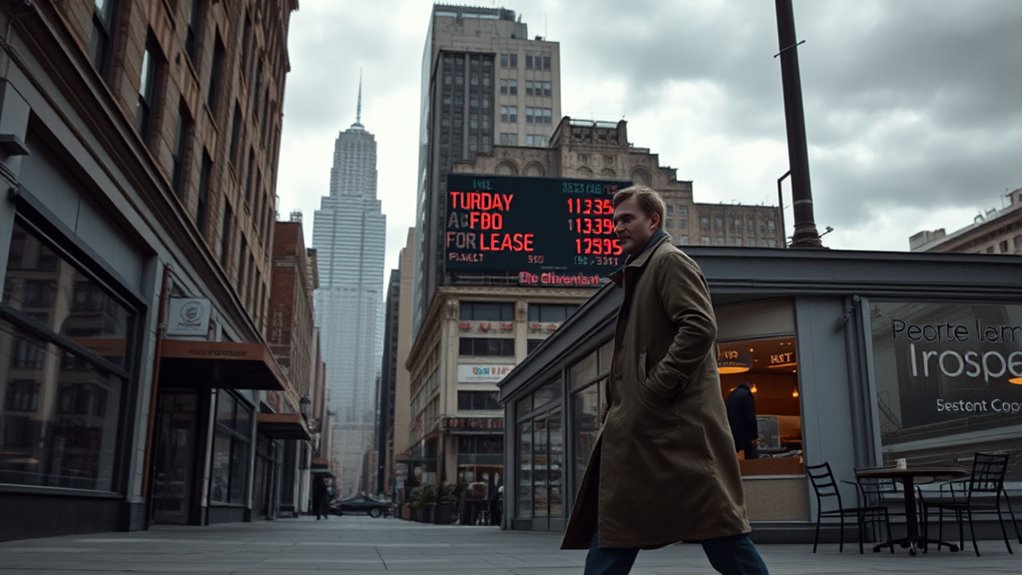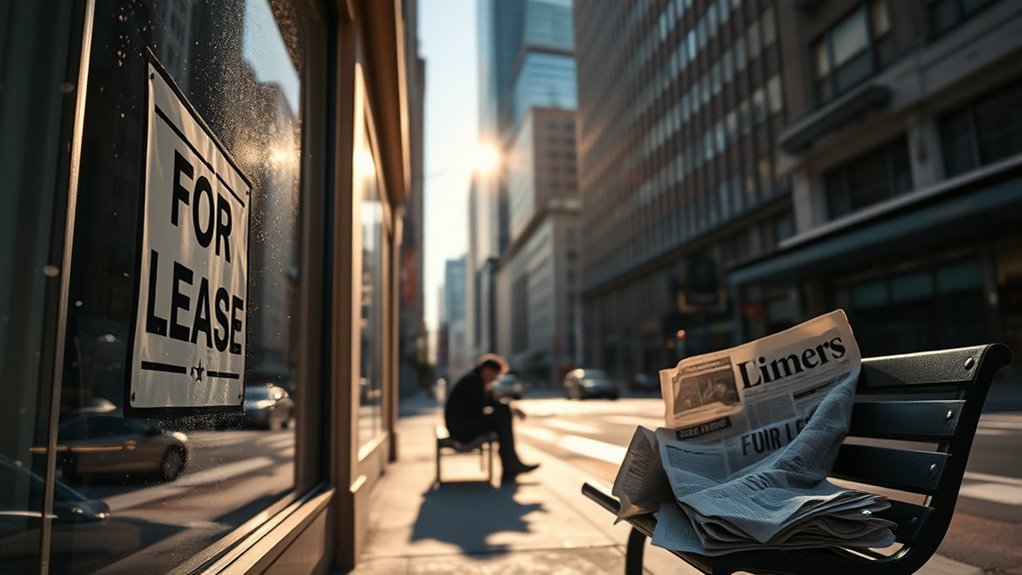A recession is a significant decline in economic activity that lasts for an extended period. You’ll notice it in areas like consumer spending, employment, and business investment. When uncertainty rises, people tend to spend less, causing businesses to cut costs and lay off workers. This creates a cycle of reduced demand and economic slowdown. Understanding the ups and downs of the economy can help you navigate these challenging times and prepare for what’s next.
Key Takeaways
- A recession is a significant decline in economic activity, affecting consumer spending, employment, and business investment.
- During recessions, consumer spending typically drops as uncertainty leads to fewer large purchases and dining out.
- Rising unemployment rates during recessions increase job insecurity and financial stress, further reducing consumer spending.
- The economic slowdown results in lower business revenues, prompting companies to cut costs and potentially lay off employees.
- Recessions are temporary; economies cycle through phases, and government stimulus measures can encourage recovery and growth.

Have you ever wondered why recessions happen and what they mean for your daily life? Understanding recessions can help you navigate the financial ups and downs that come with them. Essentially, a recession is a significant decline in economic activity that lasts for an extended period, usually visible in various sectors like consumer spending, employment, and business investment. When the economy contracts, it can feel overwhelming, but knowing how it impacts your world can make it easier to cope.
One of the most immediate effects of a recession is a drop in consumer spending. When people feel uncertain about their financial future, they tend to tighten their belts. You might notice fewer people dining out, shopping, or making large purchases. This decrease in spending can lead to a vicious cycle—businesses see lower revenues and may respond by cutting costs, which often means layoffs. As a result, unemployment rates can rise sharply during these tough times. If you’ve ever found yourself worrying about job security, you’re not alone. Many face similar concerns when the economic outlook is bleak.
As unemployment rates climb, the ripple effects can touch every aspect of your life. Friends or family members may lose jobs, and you might find yourself re-evaluating your own financial situation. It’s not just about the money; it’s about the stress that comes with uncertainty. You may feel compelled to save more and spend less, which, while prudent, can further dampen consumer spending. When everyone’s saving rather than spending, businesses struggle, and the economy continues to slow. Furthermore, during these times, high contrast ratios in consumer goods can lead to significant differences in perceived value, impacting purchasing decisions.
However, it’s crucial to remember that recessions don’t last forever. Economies go through cycles, and recovery is always possible. After periods of decline, governments often implement measures to stimulate growth, such as lowering interest rates or introducing stimulus packages. These actions can eventually encourage consumer spending again, leading to job creation and a recovery in unemployment rates.
In the end, understanding recessions helps you prepare for financial changes and make informed decisions. While they can be formidable, they’re also a natural part of the economic cycle. By staying informed and adapting your spending habits, you can navigate these challenging times more effectively. So, the next time you hear about a recession, you’ll be equipped to understand its implications and how it might affect your daily life.
Frequently Asked Questions
How Can I Prepare My Finances for a Recession?
To prepare your finances for a recession, start by tightening your personal budgeting. Review your expenses and cut out non-essentials to save more. Build an emergency fund that covers at least three to six months of living costs; this’ll provide a safety net during tough times. Additionally, consider diversifying your income streams, and keep an eye on investments. Staying proactive now can help you weather any economic storm that comes your way.
What Industries Are Most Affected During a Recession?
During a recession, industries tied closely to consumer spending, like retail and hospitality, often suffer the most. As people tighten their budgets, discretionary purchases drop, hurting sales. Similarly, sectors reliant on business investment, such as construction and manufacturing, can see declines as companies cut back on expansion plans. You’ll notice that these industries experience layoffs and reduced profits, making it vital for you to stay informed and adjust your financial strategies accordingly.
How Long Do Recessions Typically Last?
Think of a recession like a storm; it can vary in intensity and duration. Typically, recessions last around six months to a year, though some might stretch longer. You’ll notice economic indicators like rising unemployment and falling consumer spending during this time. Keep an eye on these signs; they can help you gauge how long the storm might last and when it’s safe to venture back into the economic landscape.
Can Government Policies Prevent a Recession?
Yes, government policies can help prevent a recession. By implementing fiscal stimulus, like increasing public spending or cutting taxes, they can boost demand and strengthen the economy. Additionally, monetary easing, such as lowering interest rates, encourages borrowing and investment. When you combine these approaches, governments can create a more resilient economic environment. However, timing and the effectiveness of these measures are vital, so they aren’t always guaranteed to prevent downturns.
What Are the Signs of an Impending Recession?
You’ll know a recession’s looming when consumer confidence takes a nosedive, and the stock market resembles a rollercoaster ride—up one minute, down the next. Suddenly, everyone’s hoarding cash like it’s the last slice of pizza at a party. Businesses start cutting back, hiring freezes pop up, and those “Help Wanted” signs disappear faster than your motivation on a Monday morning. Keep an eye out; the economic party’s about to get awkward!
Conclusion
In the landscape of economics, recessions are like dark storms that roll in, casting shadows over growth and opportunity. But remember, just as clouds eventually part to reveal the sun, economies can bounce back. By understanding the signs and effects of downturns, you position yourself to navigate the rough waters. Embrace the lessons learned during these times, for they can guide you toward brighter days and renewed prosperity, like a vibrant rainbow emerging after the rain.










